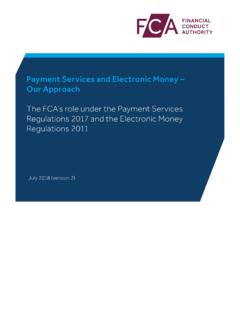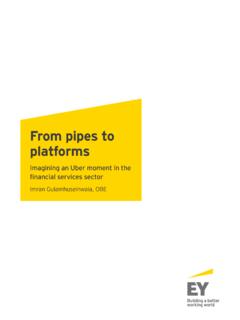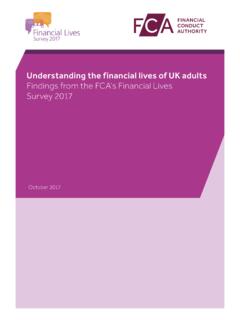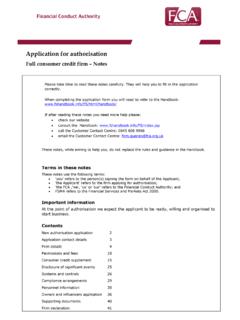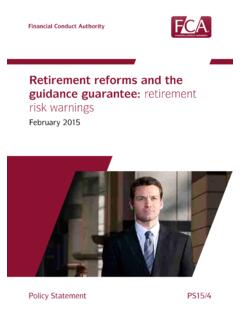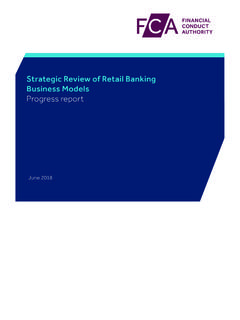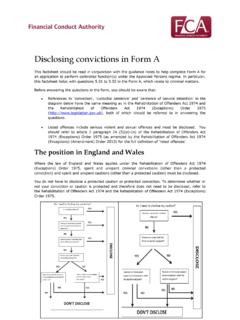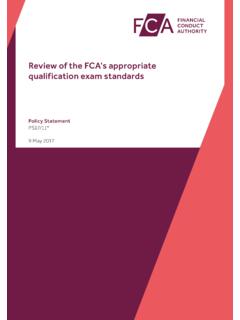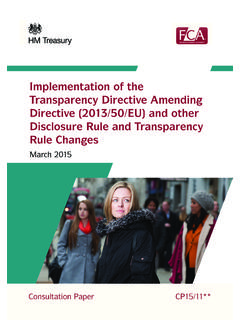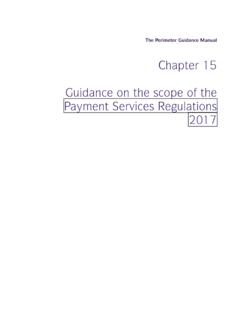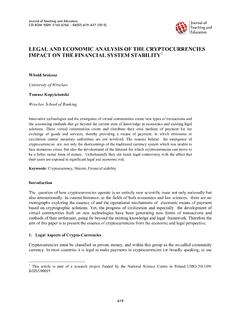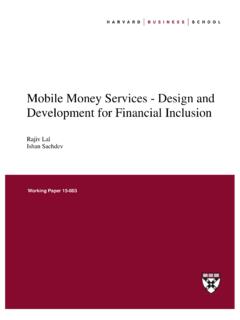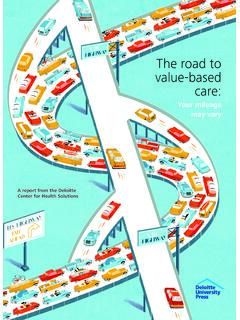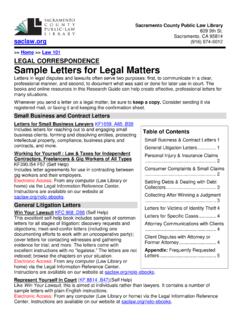Transcription of FG16-5 | FCA - Financial Services Authority
1 Financial Conduct Authority Page 1 of 18 Finalised guidance 1. Background The purpose of this guidance is to clarify the requirements on firms1 when outsourcing to the cloud and other third-party IT Services . This guidance is broader than, but includes issues covered in, Considerations for firms thinking of using third-party technology (off-the-shelf) banking solutions , which we published in July 2014 as part of our barriers-to-entry work for firms entering, or considering entering, the banking sector. While the July 2014 publication focused on banking solutions, this guidance is intended to help all firms to effectively oversee all aspects of the life cycle of their outsourcing arrangements: from making the decision to outsource, selecting an outsource provider, and monitoring outsourced activities on an ongoing basis, through to exit.
2 In October 2014, the FCA launched Project Innovate an initiative to foster innovation in Financial Services aligned with our objective to promote effective competition. Innovation can be a driver of effective competition, so we want to support innovation and ensure that regulation unlocks these benefits, rather than blocks them. In producing this guidance, we have worked closely with Project Innovate to identify areas where our regulatory framework needs to adapt to enable further innovation in the interests of consumers. 1 This guidance does not apply to credit institutions and investment firms subject to the EU Capital Requirement Regulations (EU 575/2013) banks, building societies and IFPRU investment firms as defined in the FCA Handbook; and payment and electronic money institutions to whom the EBA Guidelines on outsourcing arrangements are addressed.
3 It is relevant to all other firms authorised under FSMA. However, firms should ensure they comply with the specific requirements that apply to them based on their status. FG 16/5 Guidance for firms outsourcing to the cloud and other third-party IT Services July 2016 (updated September 2019) Guidance consultation Financial Conduct Authority Page 2 of 18 Finalised guidance Stakeholders, including firms and cloud service providers, have told us they are unsure about how we apply our rules relating to outsourcing to the cloud. Through roundtable discussions and other interactions with firms and cloud service providers, we understand that this uncertainty may be acting as a barrier to firms using the cloud. Cloud is a broad term, and stakeholders have interpreted it differently. We see it as encompassing a range of IT Services provided in various formats over the internet.
4 This includes, for example, private, public or hybrid cloud, as well as Infrastructure as a Service (IaaS), Platform as a Service (PaaS), and Software as a Service (SaaS). Cloud Services are constantly evolving. Our aim is to avoid imposing inappropriate barriers to firms ability to outsource to innovative and developing areas, while ensuring that risks are appropriately identified and managed. Using the cloud can provide more flexibility to the service that firms receive, enabling innovation and bringing benefits to firms, their consumers, and the wider market. However, it can also introduce risks that need to be identified, monitored and mitigated. These risks primarily affect the degree of control exercised by the firm and specific issues such as data security. Cloud customers may have less control of the supplier, for example the degree to which they can tailor the service provided, and of the data, such as where data are stored.
5 So, we are setting out in more detail our approach to regulating firms which outsource to the cloud and other third-party IT Services . We see no fundamental reason why cloud Services (including public cloud Services ) cannot be implemented, with appropriate consideration, in a manner that complies with our rules. We have successfully supported both new and existing firms to use cloud and other IT service solutions in a compliant manner. This guidance is not binding and is intended to illustrate ways in which firms can comply with the relevant rules. We expect firms to take note of the guidance and, where appropriate, use it to inform their systems and controls on outsourcing. The guidance is not exhaustive, nor should it be read in isolation. Firms should consider this guidance in the context of their overarching obligations under the regulatory system.
6 Based on our statutory objectives, we think that complying with this guidance will generally indicate compliance with the FCA outsourcing requirements. The Prudential Regulation Authority (PRA) has different statutory objectives, and so firms that are subject to PRA regulation should confirm their approach with the PRA. FCA guidance on rules, the Act or other legislation represents our view, and does not bind the PRA or the courts. The policy contained in this finalised guidance has been designed in the context of the existing UK and EU regulatory framework. We will keep this under review to assess whether any changes would be required due to any intervening changes in the UK regulatory framework, including as a result of any negotiations following the UK s vote to leave the EU. Guidance consultation Financial Conduct Authority Page 3 of 18 Finalised guidance 2.
7 Who does this guidance affect? This guidance aims to help firms and service providers understand our expectations where firms are using, or are considering using, the cloud and other third-party IT Services . Firms remain subject to FCA requirements even when they are subject to insolvency proceedings and so we would expect that, for example, a firm in administration would continue to comply with our outsourcing requirements. This guidance does not apply to credit institutions and investment firms subject to the EU Capital Requirement Regulations (EU 575/2013) banks, building societies and IFPRU investment firms as defined in the FCA Handbook; and payment and electronic money institutions to whom the EBA Guidelines on outsourcing arrangements are addressed2. References to firm within this guidance do not include these institutions.
8 The guidance will also be of interest to: (a) third-party IT providers seeking to provide Services to Financial Services firms (b) trade associations and consumer groups (c) law firms and other advisers (d) auditors of Financial Services firms. 3. Guidance for firms outsourcing to the cloud and other third-party IT Services Introduction A firm has many choices when designing its operating model and setting its IT strategy. It may choose to develop and operate its own Services or use a third party to cater to some or all of its needs. This market continues to evolve rapidly, with frequent new offerings and innovative ways of delivering these Services . Using third-party providers, including cloud providers, may bring benefits to firms such as cost efficiencies, increased security, and more flexible infrastructure capacity.
9 These benefits can support more effective competition. This guidance includes a list of areas that a firm should consider during its preparations for the use, evaluation and ongoing monitoring of third parties in the delivery of IT Services that are essential to the effective functioning of the regulated firm s business operations. 2 +revised+Guidelines+on+outsourcing+arran gements Chapter 2(7) sets out that the Guidelines are addressed to institutions as defined in point 3 of Article 4(1) of Regulation (EU) No 575/2013, to payment institutions as defined in Article 4(4) of Directive (EU) 2015/2366 and to electronic money institutions within the meaning of Article 2(1) of Directive 2009/110/EC. Account information service providers that only provide the service in point 8 of Annex I of Directive (EU) 2015/2366 are not included in the scope of application of these guidelines, in accordance with Article 33 of that Directive.
10 Guidance consultation Financial Conduct Authority Page 4 of 18 Finalised guidance Cloud computing As noted above, the term cloud encompasses a range of different IT Services . Each service has features and risks associated with it, and it is for firms to consider which outsourcing option is the best fit for their business. From a regulatory perspective, the exact form of the service used does not, in itself, alter the regulatory obligations placed on firms. It is important to note that where a third party delivers Services on behalf of a regulated firm including a cloud provider this is considered outsourcing and firms need to consider the relevant regulatory obligations and how they comply with them. Outsource service regulatory requirements The overall aim of the high-level regulatory obligations on outsourcing, and the detailed requirements that underpin them, is that a firm appropriately identifies and manages the operational risks associated with its use of third parties, including undertaking due diligence before making a decision on outsourcing.
